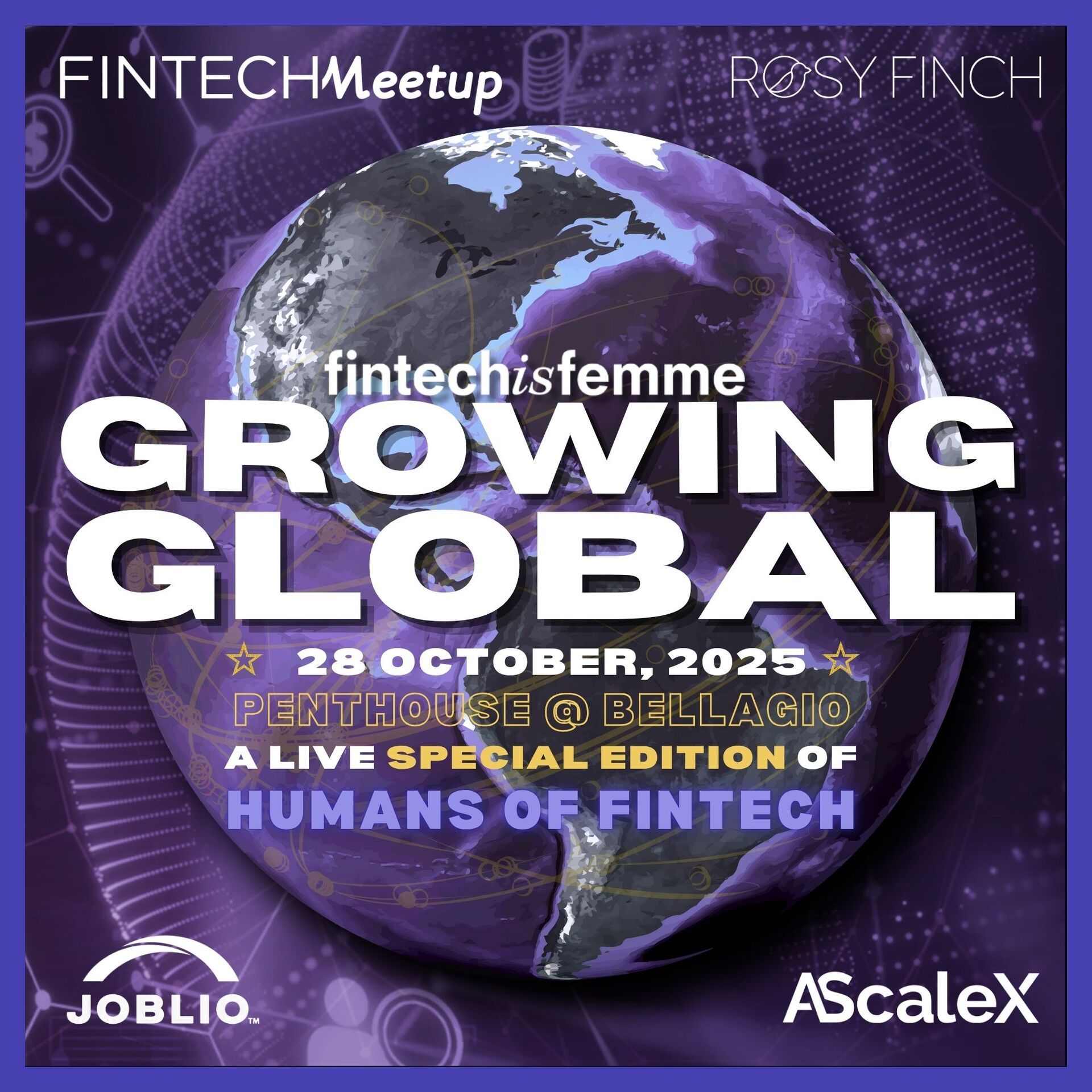- Fintech Is Femme
- Posts
- 🤑 The Cloud Crashed. Founders Didn’t.
🤑 The Cloud Crashed. Founders Didn’t.
AWS’s global outage, Piere’s $2.1 million raise, and CreditRich’s billion-dollar blueprint for equity.

Hey, fintech fam! 💜
Can you believe Money20/20 is just three days away?
This year has been wild — somehow both the fastest and slowest ever — packed with growth, change, and some serious leveling up. And I couldn’t be more excited to close it out with all of you during what I like to call our annual fintech family reunion in Vegas.
This year feels especially full-circle. For the first time, I’m bringing a full Fintech Is Femme team with me.
And as I head into my sixth Money20/20 show (across both the U.S. and Europe!), I can’t help but reflect on how far we’ve come — not just as a brand, but as a movement.
From launching this platform in a pandemic to hosting penthouse summits, podcasting from global stages, and building real community in an industry that once felt exclusive — we’ve built something that’s truly ours.
So I can’t wait to celebrate that with you — from our Fintech Is Femme penthouse events to podcasting live on the show floor, and even kicking off the show on Sunday with my session on the future of blockchain adoption.
But before we jet off to Vegas… let’s catch up on the stories shaping fintech right now.
Let's get into it.
#TRENDING
#1 The AWS Outage — And What It Reveals About Cloud Risk

When Amazon Web Services (AWS) blinked offline early Monday morning, so did much of the fintech and financial services industry.
What started as a “minor technical failure” at 3 a.m. ET cascaded into a global disruption that froze everything from digital payments to crypto trading. Chime, Venmo, Coinbase, Navy Federal, Truist, and several British banks—including Lloyds and Bank of Scotland—reported downtime.
Even capital markets felt the tremor as trading activity slowed across platforms.
By the time AWS restored full service around 6 p.m. ET, the damage was clear: a single technical glitch in Northern Virginia had exposed just how fragile the financial system’s digital backbone has become.
“A widespread outage at Amazon Web Services reverberated through the global economy,” Mehdi Daoudi, CEO of Catchpoint, told Al Jazeera. “The impact could easily reach into the hundreds of billions” from lost productivity and halted business operations.
And he’s not wrong. For fintech, this wasn’t just an inconvenience — it was a stress test for the cloud-first era.
Fintech’s Dependency Problem
A large part of the modern financial ecosystem runs on AWS.
Banks and fintechs use AWS databases like DynamoDB to power high-volume payments and trading, while Amazon’s Aurora supports core banking systems that handle deposits, transactions, and fraud detection.
Even regulators rely on it. FINRA, the Financial Industry Regulatory Authority, uses AWS to analyze billions of daily market events for anomalies and manipulation.
This deep entanglement means that when one region of AWS falters — in this case, the massive US-EAST-1 cluster — the effects ripple through every layer of the financial web.
And that’s what we saw: a disruption that turned a single point of failure into a global financial moment.
The Core Issue: Concentration Risk
Financial regulators have been sounding alarms about this for years:
Too many mission-critical systems sit on too few platforms.
AWS, Microsoft Azure, and Google Cloud collectively power 60% of the global financial internet. For fintechs, that concentration has been both an enabler and a liability — fueling speed and scale, but also embedding systemic fragility.
Cloud concentration risk isn’t just theoretical.
Every year, we see small-scale disruptions — a Cloudflare update here, a database misfire there — ripple through everything from neobanks to credit unions. But Monday’s AWS outage was the rare, global reminder of how high the stakes are when milliseconds of latency can cost millions in trades or trust.
What Went Wrong — and Why It Matters
AWS engineers traced the incident to a failure within its EC2 internal network, later linked to a Domain Name System (DNS) breakdown — basically, a moment where the cloud forgot where things live.
That short lapse disrupted everything from app connectivity to API integrations — and in fintech, APIs are oxygen. Without them, payments stall, trades can’t execute, and customers lose access to their money.
As Joe Higginson, Head of Financial Institutions for the Americas at Convera, put it during a recent panel:
“Financial institutions can’t afford single points of failure. We’re past the era of hoping systems stay up — resilience has to be built in by design.”
Traditional banks have backup systems and hybrid deployments — a mix of on-premise and cloud operations — that can sometimes absorb these shocks.
But fintechs, especially those born in the cloud, don’t have that luxury.
Startups that rely exclusively on AWS for both production and data storage essentially have no “Plan B.”
That’s what makes these outages existential.
For fintech operators, this week’s outage is a wake-up call to reassess three key areas:
Multi-Cloud Strategies – Distribute workloads across AWS, Azure, and Google Cloud to prevent total paralysis.
Vendor Dependency – Map your tech stack to identify single points of failure.
Customer Communication – When outages happen, transparency is everything. A 20-minute delay in messaging can do more reputational damage than the outage itself.
The Bigger Picture: A Global Reminder
The AWS outage is a reminder that in a world where $290 trillion in cross-border payments move annually, even the best cloud infrastructure can’t outrun systemic interdependence.
That’s why regulators — and innovators — are betting on ISO 20022, the international standard for payment data exchange that’s quietly becoming the backbone of next-gen financial infrastructure.
ISO 20022 replaces fragmented, proprietary systems with a unified data language — one that improves accuracy, compliance, and speed across borders.
By July 2025, the Federal Reserve’s FedNow and Fedwire systems will require ISO 20022 compatibility, pushing US institutions into alignment with nearly 80 countries already operating real-time payment (RTP) systems — including India, Brazil, and the Netherlands.
If the AWS outage was a test of fragility, ISO 20022 is a blueprint for durability.
It’s how financial systems start speaking the same language — and eventually, how money moves globally in real time.
The takeaway?
Cloud adoption isn’t the risk — overreliance is.
Innovation depends on trust, and trust depends on uptime.
As I wrote last year:
“Fintech’s greatest strength — its speed — can also be its Achilles’ heel. The future belongs to the builders who slow down long enough to design for continuity.”
#2 Inside Piere’s $2.1M Raise — and “Self-Driving Money”

Piere founder and CEO Yuval Shmul Shuminer
On Tuesday, Piere, an AI-first financial automation startup, announced a $2.1 million pre-seed to build what founder Yuval Shmul Shuminer calls “self-driving money.”
The round was led by Grand Ventures with participation from Selah Ventures, Trustage Ventures, Samvid Ventures, and Fabric VC, plus fintech insiders like Aditya Khurjekar, co-founder of Money20/20.
It’s a round with big ambition — not to reinvent banking, but to quietly fix how most people actually live with money: reactively, anxiously, and largely on autopilot already.
The Real Problem: Financial Paralysis
Let’s be honest — most people don’t want to “engage” with their finances.
They want stability, clarity, and not to feel stupid every time they open their banking app.
“There’s maybe 10–20% of people who actually want to engage with their finances every day,” Shuminer told me, “the other 80–90% just don’t.”
And yet, fintech keeps shipping tools that demand more engagement — more dashboards, more gamified nudges, more “check your balance and feel bad about it” moments.
Piere is built on the opposite premise: the less time you spend inside the app, the better it’s working.
What “Self-Driving Money” Actually Means
Piere’s platform connects to your accounts, studies your income and spending, and automatically executes smart money moves on your behalf.
If you’ve got too much cash sitting idle in checking, it moves it to a higher-yield account.
If a bill is coming due, it makes sure you’re liquid.
If your student loan interest spikes, it nudges you to pay extra this cycle.
It’s not budgeting. It’s orchestration — a money management engine running quietly in the background.
“We’re not trying to make people open our app every day,” Shuminer said. “If you don’t think about it, that means we’re doing our job.”
A Break From the Dashboard Era
Fintech has spent the last decade teaching people to look — at their spending habits, their goals, their investments.
But looking isn’t doing.
That’s why products like Mint, Monarch, and even CoPilot struggled to create long-term loyalty. They give you data, not decisions.
Piere closes that gap — not by reinventing finance, but by executing the boring stuff no one else wants to touch.
It’s the infrastructure layer for everyday money movement — for the 90% who don’t need a “financial coach,” they just need something that works.
Organic Growth, the Old-School Way (on Reddit)
Piere’s growth story might be the most unexpected part.
Shuminer built an engaged community on Reddit, where users share stories of financial wins and frustrations.
“We got off the ground entirely organically,” she said. “We found ways to engage where we weren’t promoting the product — we were promoting outcomes. People came to us.”
One of their Reddit posts hit 8 million views, driving tens of thousands of users to sign up.
And yes — users actually talk to each other, give feedback, and hold the company accountable.
It’s an old-school playbook revived for a new fintech era: transparency, community, and earned trust over ad spend.
What This Signals for Fintech’s Next Chapter
If the last five years of covering consumer fintech taught me anything, it’s this: the last era was about access — getting people banked, invested, and engaged.
The next five will be about execution — turning that access into real, measurable outcomes.
AI is enabling something fintech has promised for a decade but rarely delivered: automated action that feels personal.
Piere isn’t alone in chasing this idea, but it’s one of the few doing it without gimmicks. Just clean automation for everyday people.
And that’s exactly what makes it disruptive.
“You shouldn’t need to be wealthy to get personalized financial guidance,” said Shuminer. “You just need data.”
That’s the heart of it.
#3 Angel Rich’s CreditRich Goes Live on Google and Apple

This week, Angel Rich, founder and CEO of CreditRich, announced that her fintech platform is officially live on Google and Apple, fully approved for financial transactions.
It’s a milestone that might read like a technical update — but in fintech, reaching this level of compliance across both ecosystems is rare air.
“This has been one of the hardest journeys of my life with so many unexpected turns,” Rich shared on LinkedIn. “We can kiss the finish line — and now must keep pushing forward on funding so that we may skyrocket with our groundbreaking product.”
Backed by Visa and Equifax, the launch marks a major leap for one of fintech’s most fearless founders — and a pivotal step toward her mission to rebuild credit from the inside out.
Reprogramming the System
When Rich took the stage at the Fintech Is Femme Leadership Summit in April this year, she made one thing clear: she didn’t come to play by the rules — she came to rewrite them.
“They told me the FICO algorithm was too complicated to understand,” she said. “It’s not. You just have to care enough to peel it apart.”
And she did.
CreditRich is a system that uses automation to help people actually win at credit.
The app rounds up spare change from everyday purchases and applies it toward high-impact debt payments.
Its AI engine prioritizes liabilities that most affect users’ credit scores and delivers real-time insights through integrations with Experian and Equifax.
“If you help people simply pay their bills on time,” Rich said, “you can raise their scores significantly. Half the battle is just creating a system designed for people to win.”
Building Power Without Permission
Rich didn’t wait for VC approval — she built power through partnerships.
Cold-calling her way into rooms with Visa and credit bureaus, she secured enterprise contracts now valued at nearly $400 million.
She’s currently raising a $100 million Series B, with projections pointing toward a $1 billion valuation.
Not bad for a founder who was once told that understanding credit scoring “wasn’t her lane.”
At a time when fintech often celebrates fast growth over real impact, Rich’s playbook is the opposite: earn trust, build compliance, scale responsibly.
Watch my full interview with Angel Rich live at the Fintech Is Femme Leadership Summit NYC here.
MARK YOUR CALENDARS
Join us every Thursday to stay up to date on our fintech events!
[VIRTUAL] FINTECH BEST-IN-SHOW: Fintech Is Femme Edition

I’m thrilled to team up with Empire Startups once again to spotlight the bold, brilliant women shaping the future of finance.
From payments to lending, investing to insurtech — these early-stage founders aren’t just launching startups. They’re rewriting the rules of money.
At each virtual event, five standout startups will pitch live. A panel of sharp judges from FIS, TruStage Ventures, Artemis, and Fiserv will give real-time feedback. And yes — we’ll crown a Best in Show winner.
This isn’t your average pitch night. It’s a collision of innovation, capital, and community.
💻 Join us from anywhere — register now to see what the next generation of fintech looks like.
[LAS VEGAS] Growing Global at Money20/20

In partnership with Fintech Meetup, Rosy Finch Method & Co., Joblio, and AScaleX — we’re hosting a networking breakfast + live Humans of Fintech podcast to explore what it actually takes to scale fintech across borders.
Featuring powerhouse leaders driving global innovation:
🎙️ Mary Murcko, Head of Growth, Fintech Meetup
🎙️ Jessica Johnson, MBA, Founder & CEO, Rosy Finch Method & Co.
🎙️ Remy Sirls, Executive Director, Joblio
This is more than a breakfast — it’s a strategy session for the future of fintech. 🌐
Space is limited — RSVP now to secure your seat.
[LAS VEGAS] A Toast to Women in Fintech

Hosted in the Bellagio Penthouse during Money20/20, this special gathering — co-created with Wysh, Stripe, Casap, Goodfin, Consumer Reports, and NAFLI — celebrates the leaders building a more inclusive financial future.
FINTUNES
See you IRL in Vegas on Monday!

LET’S CONNECT
📰 Share this newsletter with a friend and start growing your network.
🔗 Connect with me on LinkedIn for daily insights on leadership.
🤝 Meet the industry leaders who can change your career at the Leadership Summit.
📣 Promote yourself to 50,000 subscribers by sponsoring this newsletter.
🎤 Host an epic event by booking me as a speaker, moderator, or emcee.
📚 Increase your expertise by ordering your copy of my book, Fintech Feminists: Increasing Inclusion, Redefining Innovation, and Changing the Future for Women Around the World.
⭐️ P.S. If you’ve read Fintech Feminists (or listened to the audiobook!), I’d be so grateful if you could take 30 seconds to leave a review or rating on Amazon here. Your support means the world to me. A million thanks in advance!
That wraps up today’s edition—thanks for reading!
Until next week, keep innovating and challenging the status quo. See you Tuesday!
Love,
Nicole 💜